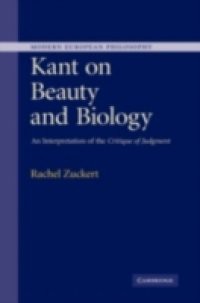Kant's Critique of Judgment has often been interpreted by scholars as comprising separate treatments of three uneasily connected topics: beauty, biology, and empirical knowledge. Rachel Zuckert's book interprets the Critique as a unified argument concerning all three domains. She argues that on Kant's view, human beings demonstrate a distinctive cognitive ability in appreciating beauty and understanding organic life: an ability to anticipate a whole that we do not completely understand according to preconceived categories. This ability is necessary, moreover, for human beings to gain knowledge of nature in its empirical character as it is, not as we might assume it to be. Her wide-ranging and original study will be valuable for readers in all areas of Kant's philosophy.

